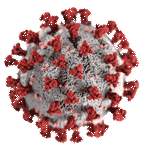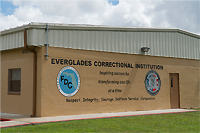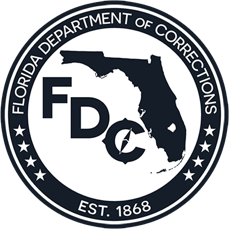2020
OFFENDER POPULATION JUNE 30, 2020
INMATES: 87,736
SUPERVISED: 153,581
INMATES: 87,736
SUPERVISED: 153,581
COVID-19
March 2020, the COVID-19 pandemic reaches the Florida Department of Corrections.
- March 22, FDC’s first staff tests positive for COVID-19.
- April 4, FDC’s first inmate tests positive for COVID-19.

From this point forward, the intensity of the fight against COVID-19 increases, peaking the week of August 9, when 45 facilities have active outbreaks. The level of effort on the part of staff, both FDC and the contracted healthcare provider, is nothing short of heroic. The cooperation of inmates is also instrumental in successfully containing the virus and maintaining order in the institutions.
Beginning in early March, FDC suspends all inmate visitation, initiates 24/7 infectious disease monitoring, temporarily suspends intakes from county jails, publishes a plan of action for continuity of all procedures and specialty care, and suspends non-critical transfers between facilities. The Office of Health Services also implements statewide institutional protocols for enhanced cleaning, Personal Protective Equipment (PPE) use, screening, and the creation of a medical triage system for inmates.
Positive and symptomatic patients are placed in medical isolation, and close contacts are placed in medical quarantine for observation. Staff immediately responds to confirmed positive cases by conducting broad-based inmate and staff testing at affected institutions.
Community Corrections staff also developed innovative methods to continue supervising offenders on probation during the pandemic. From the onset of the pandemic through December 2020, Probation Officers conducted 838,000 field contacts, 428,000 office contacts, 206,000 treatment contacts, 777,000 telephone contacts, 43,000 curfew checks, 100,000 walkthroughs, 4,550 searches and 102,000 on-site drug tests.
![]() On March 30, Prison Industries and Diversified Enterprises (PRIDE) at Avon Park C.I. announces that inmates working for them are increasing production of cleaners and disinfectants. PRIDE produces an additional 600 gallons of hand wash and approximately 5,000 additional gallons of germicidal products per day above their normal production rates. PRIDE’s Sanitary Maintenance and Supply (SM&S) factory is located at Avon Park C.I. FDC’s long-standing partnership with PRIDE provides vocational training to inmates through more than 35 paid job training programs across 20 Florida correctional institutions.
On March 30, Prison Industries and Diversified Enterprises (PRIDE) at Avon Park C.I. announces that inmates working for them are increasing production of cleaners and disinfectants. PRIDE produces an additional 600 gallons of hand wash and approximately 5,000 additional gallons of germicidal products per day above their normal production rates. PRIDE’s Sanitary Maintenance and Supply (SM&S) factory is located at Avon Park C.I. FDC’s long-standing partnership with PRIDE provides vocational training to inmates through more than 35 paid job training programs across 20 Florida correctional institutions.
September – To help offset the lack of visitation imposed on institutions because of the COVID epidemic, FDC partners with JPay and Securus to offer the following complimentary communication credits through October 25, 2020:
- One free video visitation session per JPay account linked to a Florida inmate;
- One free phone call up to 15 minutes in length per incarcerated individual each week; and
- Two free JPay Stamps for each inmate, each week.
PUTTING COVID IN PERSPECTIVE
After battling the COVID-19 epidemic for months, Secretary Inch puts FDC’s response to it in perspective in his message to staff, likening it to the Muhammad Ali – George Foreman fight strategy.
“It was 1974. The rising and dominant star of the boxing world, 25-year-old undefeated world heavyweight champion George Foreman took on a challenge from a former champion, the remarkable – but seven years older – Muhammad Ali. Called the “Rumble in the Jungle,” the odds-on favorite, George Foreman, with his imposing size and strength, went on the attack and put Ali on the ropes for the first five rounds. Muhammad Ali covered up and took blow after blow, looking like defeat was inevitable. But in the sixth round, Ali came off the ropes. In a stunning tactic, Ali had intentionally exhausted his opponent with the now famous “rope-a-dope,” and then took control. By that sixth round, it was clear that Foreman had spent his strength. Muhammad Ali won the bout with an eighth-round knockout.
Team, we’ve been in the ring for seven rounds of what may be a 15-round bout with COVID-19. It may be fewer rounds if we get a vaccine that knocks out the virus early. Your service has been amazing, but we have taken a lot of body shots. As a Department, we had to lay back against the ropes and suspend visitation and volunteer activities. We had to greatly reduce new commitments, intra-facility transfers, scheduled medical appointments, programming and education. We had to reduce out of facility work squads and shift efforts to greater levels of sanitation. We practiced cohort distancing and reduced by half those in our dining facilities at one time. Yep, we had to lean against the ropes, but like Muhammad Ali, we did this by design. But to win these next eight rounds, it is now time to come off the ropes!”
Seventeen institutions convert from 12-hour shifts to 8.5 hour shifts to improve overall safety and increase a positive work-life balance for staff.
As of July 2020, all inmates in work/community release centers have been placed on electronic monitoring.
STAFFING
September - The FDC announces $1,000 hiring bonuses for new hires at institutions statewide. Applicants who complete their correctional officer certification through either FDC or certain state colleges are eligible for the bonus.
FDC provides retention incentive pay to a portion of its corrections staff. On October 1, 2020, the targeted retention incentive pay was provided to CO’s through the rank of Colonel, CPOs through the rank of Correctional Probation Senior Supervisor, and Office of the Inspector General Inspectors through the rank of Inspector Supervisor. The increases are $500 for those with fewer than two years of service, $1,500 for those with two to five years, and $2,500 for five or more years. In addition, all state employees receive a 3% pay raise on October 1, 2020.
SSCIS, ICIS & AMUs
The FDC continues its efforts to use institutions themselves as a tool to manage the inmate population, by creating prisons specifically for inmates with short sentences, stable inmates, and disruptive inmates:

Short Sentence Correctional Institutions (SSCIs) are established to house inmates with less than one year remaining on their sentences. This strategy allows FDC to provide programs and treatment targeted to these inmates’ unique needs during their short stay in FDC custody. Ten inmates from institutions statewide designed an inmate-led mentoring program used in these SSCIs. The program focuses on reducing violence and providing guidance to inmates with short sentences, with the goal of successfully restoring them to their communities as law-abiding citizens.
Incentivized Correctional Institutions (ICIs) are voluntary, specialized facilities giving inmates the opportunity to complete their sentences within a population of focused, discipline-free individuals if they meet eligibility criteria. Incentivized prisons can provide additional benefits, such as extra visitation, to promote good behavior and as an incentive to inmates. ICIs expanded to four additional facilities following a successful pilot program at Everglades CI. They are:
- Marion Correctional Institution;
- Madison Correctional Institution;
- Jefferson Correctional Institution; and
- Lowell Correctional Institution Annex.
Administrative Management Units (AMUs) are created to separate predatory, disruptive and potentially violent inmates so they can’t prey on vulnerable inmates in the general population. Although this group’s behavior may not warrant a recommendation to Long-Term Restricted Housing, they adversely impact the rehabilitation process of cooperative inmates. This structured environment sets conditions necessary to enhance and target rehabilitative programming, and focuses on helping AMU inmates realize there is an alternative to unproductive and violent lifestyles. AMUs are an efficient management tool to create safer prisons, reduce violence and provide less stressful conditions for inmates and staff in prison. FDC establishes the first AMU at Jackson CI.
Twenty-seven facilities, including privatized prisons, met or exceed the standards set in the Prison Rape Elimination Act (PREA) final audit reports.
SB1118 authorizes the deposit of up to $2.5 million from canteen and phone commissions to invest in inmate programming, including literacy, education, vocational, substance use disorder treatment, chapels, family and wellness programs and libraries.
Sixteen more institutions receive national accreditation from the American Correctional Association, with 100% compliance with mandatory standards and more than 98% compliance with non-mandatory standards.
Governor Ron DeSantis creates the Florida Foundation for Correctional Excellence to strengthen public and private partnerships to increase investment in re-entry programs and workforce training.
The recidivism rate for inmates drops to 24.1% (for inmates who were released in 2017), meaning for those inmates who were released in 2017, 24.1% of them returned to a Florida state prison within a three-year period.
There are no executions in 2020.
- 1821-1845
- 1868-1876
- 1877-1895
- 1900-1919
- 1921
- 1922-1924
- 1927
- 1928-1931
- 1932 | CHAPMAN
- 1933-1935
- 1936-1939
- 1940-1945
- 1946-1949
- 1950-1955
- 1956-1961
- 1962 | WAINWRIGHT
- 1963-1965
- 1966-1969
- 1970-1975
- 1976-1979
- 1980-1986
- 1987 | DUGGER
- 1988-1990
- 1991 | SINGLETARY
- 1992-1995
- 1996-1998
- 1999 | MOORE
- 2000-2002
- 2003 | CROSBY
- 2004-2005
- 2006 | MCDONOUGH
- 2007
- 2008 | MCNEIL
- 2009-2010
- 2011 | BUSS
- 2011 | TUCKER
- 2012 | CREWS
- 2013-2014
- 2014 | JONES
- 2015-2018
- 2019 | INCH
- 2020-2021
- 2021 | DIXON
- 2022-Today
- Population Summary Table

